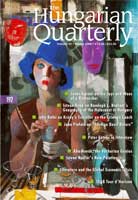Alvinczi de Genere Szemere
Alvinczi de Genere Szemere
Author(s): John BatkiSubject(s): Literary Texts
Published by: Society of the Hungarian Quarterly
Summary/Abstract: In time to come Gyula Krúdy (1878–1933) will emerge (for English-language readers as well) as Hungarian letters’ stellar contribution to world literature, and be seen among the stars of Shakespearean magnitude, very few of whom have showed up to accept a Nobel Prize. Krúdy’s stature is vouchsafed by the scale and scope of his oeuvre, a vast and varied output of prose frequently steeped in a music that raises it to the level of poetry. The high drama of Krúdy’s literary work stems from the interplay of its diverse “forms” and “contents”, the complex shifts of narrative viewpoints in time and psychic space—richly rewarding for students of narratology—as well as the perennial tensions inherent in the uses and values of words in literary texts that meld fact and fiction. Journalism and entertainment— indeed, journalism as entertainment—was Krúdy’s livelihood, a daily outpouring of artful prose whose depths, abundant in parody, merit and reward intertextual reading. Indeed, in retrospect, this oeuvre may be seen to anticipate not only recent trends in literary theory, but also the present-day state of affairs in the rapidly and desperately evolving mass media where a Hollywood movie or a work of pulp fiction can not only reflect but, surprisingly, predict the course and outcome of an upcoming presidential election, while Jon Stewart’s absurdly parodistic “Daily Show” effectively replaces network news as the information source for many millions. Pound’s dictum, “literature is news that stays news”, takes on new meaning as we read Krúdy’s accounts, fact and fiction, of a Hungary he viewed and reported on a hundred years ago.[...]
Journal: The Hungarian Quarterly
- Issue Year: 2008
- Issue No: 192
- Page Range: 99-114
- Page Count: 16
- Language: English

